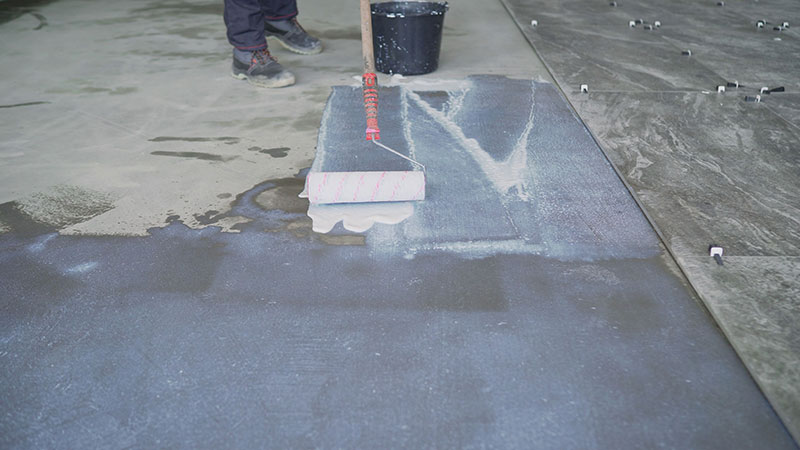It’s a hard-knock life—for outdoor concrete. Just consider the year-round punishment outdoor concrete surfaces take in the Western states:
Spring – April showers might bring May flowers, but what do they do to concrete patios, walkways and driveways? They bring the water that can create holes and swell the ground material under a slab, ultimately leading to the sinking and cracking of an unsealed concrete slab.
Summer – Extreme heat can worsen concrete cracks. And the sun’s ultraviolet rays can weaken unsealed concrete from the inside out.
Fall – Who doesn’t love the changing leaves? Concrete. That’s who. Along with the water-related damage that can come from autumn showers, fallen leaves can stain unsealed concrete.
Winter – The doozy of all seasons. Unsealed concrete suffers a slow and painful demise during the winter months. Freeze-thaw cycles are mostly to blame. Water enters concrete pores, then expands as the temperature plunges to freezing—creating cracks.
So, what’s the solution to these yearlong outdoor concrete challenges? A quality outdoor concrete sealer.
How to Choose the Best Sealer for Your Outdoor Concrete
Outdoor concrete is well protected from water penetration, stains and corrosion with a high-quality surface sealer. In one way or another, these help to protect against ice, moisture, deicers, excess wear and more. When it comes to sealers, it’s always best to buy the best. High-quality sealer products, like those sold at Intermountain Concrete Specialties, hold up longer and won’t yellow. (Helpful hint: epoxy sealers will tend to yellow in the sun.)
Basically, there are two types of concrete sealers: surface (film-forming) sealers and penetrating (under the surface) sealers.
Surface concrete sealers create a protective, physical membrane on the concrete surface. These are usually acrylic and either a water base or solvent base. Solvent base sealers are generally used outdoors, while water base sealers are used indoors. Any form-filming membrane can get slippery when wet. So, if you are concerned with a slippery surface, we typically recommend a grit be added to the sealer—specifically, WR Meadows Sure Step.
We recommend and carry these concrete sealers:
- Solvent base (generally outdoor use): WR Meadows – ICS 309, Decraseal, ICS High Gloss, Brickform – Polyseal
- Water base (generally indoor use): WR Meadows – Vocomp 20, Vocomp 25, Decreaseal, Newlook – Smartseal.
- Epoxy and Urethanes (indoor use): Clear Newlook NL60 (Helpful hint: Urethane is perfect over stained concrete or when a durable surface is preferred.)
Penetrating concrete sealers work underneath the surface. Generally, they either chemically react with free lime to increase concrete strength and density or clog the pours of concrete to prevent anything from penetrating.
Penetrating sealers are longer lasting as they do not “wear off,” as does a surface sealer. These also leave a natural look to the concrete and will not yellow, as they do not leave a membrane.
We recommend and carry these concrete sealers:
- R. Meadows – Intraguard, Decraseal Natural, Pentreat 244, Convergent – Pentraseal 244+, Creto Worldwide – Creto, Newlook – Sharkseal, Master Builders – Masterprotect H400
How to Maintain Outdoor Concrete Sealer
Applying concrete sealers to new or old concrete alike can help protect it from corrosion and premature wear. But, like most things, concrete sealers require regular maintenance. Even light to moderate traffic areas should be resealed every three to five years. And frequent cleaning keeps outdoor concrete surfaces looking their best.
Choosing the right sealer for your application will help keep your concrete in the best condition possible, so you can enjoy it for years to come. Visit your local Intermountain Concrete Specialties location for any concrete help you need. With seven locations, from St. George to Idaho Falls, help is never far away.
